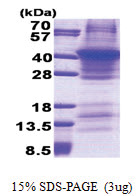Renin (67-406, His-tag) Human Protein
Other products for "REN"
Specifications
| Product Data | |
| Species | Human |
| Expression Host | E. coli |
| Expression cDNA Clone or AA Sequence |
MGSSHHHHHH SSGLVPRGSH MGSHMLTLGN TTSSVILTNY MDTQYYGEIG IGTPPQTFKV VFDTGSSNVW VPSSKCSRLY TACVYHKLFD ASDSSSYKHN GTELTLRYST GTVSGFLSQD IITVGGITVT QMFGEVTEMP ALPFMLAEFD GVVGMGFIEQ AIGRVTPIFD NIISQGVLKE DVFSFYYNRD SENSQSLGGQ IVLGGSDPQH YEGNFHYINL IKTGVWQIQM KGVSVGSSTL LCEDGCLALV DTGASYISGS TSSIEKLMEA LGAKKRLFDY VVKCNEGPTL PDISFHLGGK EYTLTSADYV FQESYSSKKL CTLAIHAMDI PPPTGPTWAL GATFIRKFYT EFDRRNNRIG FALAR
|
| Tag | His-tag |
| Predicted MW | 39.9 kDa |
| Concentration | lot specific |
| Purity | >80% by SDS - PAGE |
| Presentation | Purified |
| Buffer | Presentation State: Purified State: Liquid purified protein Buffer System: 20 mM Tris-HCl buffer (pH 8.0) containing 0.4M urea, 10% glycerol |
| Preparation | Liquid purified protein |
| Storage | Store undiluted at 2-8°C for one week or (in aliquots) at -20°C to -80°C for longer. Avoid repeated freezing and thawing. |
| Stability | Shelf life: one year from despatch. |
| Reference Data | |
| RefSeq | NP_000528 |
| Locus ID | 5972 |
| UniProt ID | P00797 |
| Cytogenetics | 1q32.1 |
| Synonyms | ADTKD4; HNFJ2; RTD |
| Summary | This gene encodes renin, an aspartic protease that is secreted by the kidneys. Renin is a part of the renin-angiotensin-aldosterone system involved in regulation of blood pressure, and electrolyte balance. This enzyme catalyzes the first step in the activation pathway of angiotensinogen by cleaving angiotensinogen to form angiotensin I, which is then converted to angiotensin II by angiotensin I converting enzyme. This cascade can result in aldosterone release, narrowing of blood vessels, and increase in blood pressure as angiotension II is a vasoconstrictive peptide. Transcript variants that encode different protein isoforms and that arise from alternative splicing and the use of alternative promoters have been described, but their full-length nature has not been determined. Mutations in this gene have been shown to cause hyperuricemic nephropathy familial juvenile 2, familial hyperproreninemia, and renal tubular dysgenesis. [provided by RefSeq, May 2020] |
| Protein Families | Druggable Genome, Secreted Protein |
| Protein Pathways | Renin-angiotensin system |
Documents
| FAQs |
| SDS |
Resources
Recombinant Protein Resources |
{0} Product Review(s)
0 Product Review(s)
Submit review
Be the first one to submit a review
Product Citations
*Delivery time may vary from web posted schedule. Occasional delays may occur due to unforeseen
complexities in the preparation of your product. International customers may expect an additional 1-2 weeks
in shipping.






























































































































































































































































 Germany
Germany
 Japan
Japan
 United Kingdom
United Kingdom
 China
China
